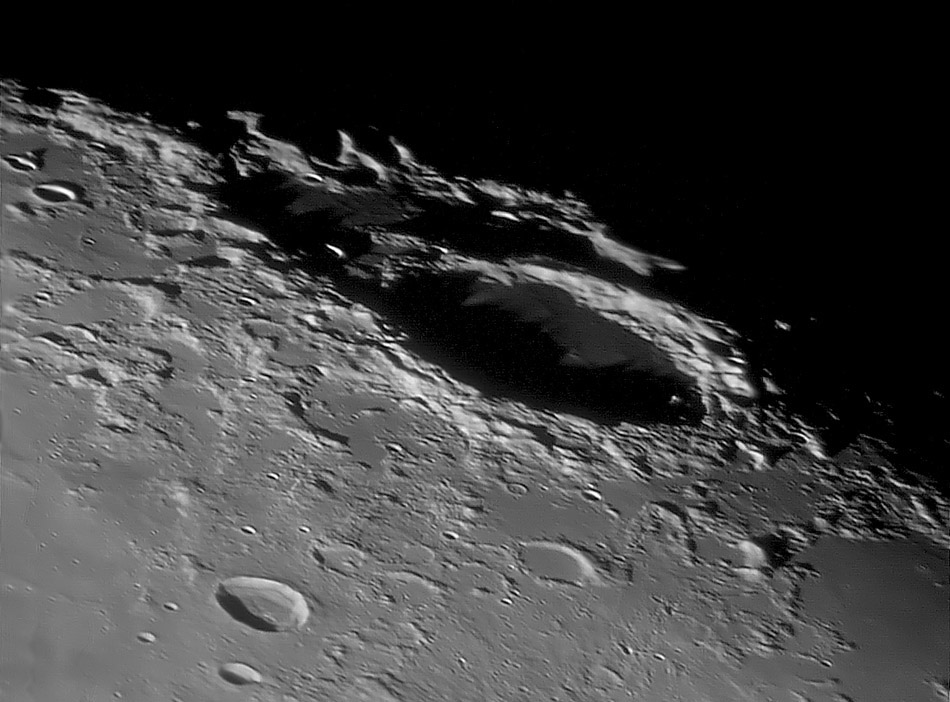Difference between revisions of "January 4, 2010"
| Line 3: | Line 3: | ||
<!-- ws:start:WikiTextHeadingRule:1:<h1> --> | <!-- ws:start:WikiTextHeadingRule:1:<h1> --> | ||
<!-- ws:start:WikiTextLocalImageRule:16:<img src="/file/view/LPOD-Jan4-10.jpg/111515135/LPOD-Jan4-10.jpg" alt="" title="" /> -->[[File:LPOD-Jan4-10.jpg|LPOD-Jan4-10.jpg]]<!-- ws:end:WikiTextLocalImageRule:16 --><br /> | <!-- ws:start:WikiTextLocalImageRule:16:<img src="/file/view/LPOD-Jan4-10.jpg/111515135/LPOD-Jan4-10.jpg" alt="" title="" /> -->[[File:LPOD-Jan4-10.jpg|LPOD-Jan4-10.jpg]]<!-- ws:end:WikiTextLocalImageRule:16 --><br /> | ||
| − | <em>image by [mailto:From:s_fire@online.ua | + | <em>image by [mailto:From:s_fire@online.ua Pavel Presnyakov], Kiev Ukraine</em><br /> |
<br /> | <br /> | ||
| − | Endymion is a bland Plato-like crater that often serves as a [http://www.lpod.org/?m=20071021 | + | Endymion is a bland Plato-like crater that often serves as a [http://www.lpod.org/?m=20071021 marker] for the Humboldtianum Basin beyond. Under Pavel's unusual low light view the variation in shadow lengths within the crater map out differences in rim height and, to a lesser degree, floor elevations. Freshly formed craters have rims that are mostly even (if the craters aren't strongly oblique or form on slopes) but over time pieces of the rim (scallops) collapse downslope and subsequent impacts carve out notches. The area in front of Endymion is marshy in that lava has leaked to the surface in many places, embaying older craters and filling low spots. Perhaps there is an as yet undetected ancient basin here that provided fractures and a depression to account for the leakage and ponding of lava; if not the reason for the swampland is unknown.<br /> |
<br /> | <br /> | ||
| − | <em>[mailto:tychocrater@yahoo.com | + | <em>[mailto:tychocrater@yahoo.com Chuck Wood]</em><br /> |
<br /> | <br /> | ||
<strong>Technical Details</strong><br /> | <strong>Technical Details</strong><br /> | ||
| Line 14: | Line 14: | ||
<strong>Related Links</strong><br /> | <strong>Related Links</strong><br /> | ||
Rükl plate [http://the-moon.wikispaces.com/R%C3%BCkl+7 7]<br /> | Rükl plate [http://the-moon.wikispaces.com/R%C3%BCkl+7 7]<br /> | ||
| − | Pavel's image [http://www.astroclub.kiev.ua/gallery/search.php?search_user=S.Fire | + | Pavel's image [http://www.astroclub.kiev.ua/gallery/search.php?search_user=S.Fire gallery]<br /> |
<br /> | <br /> | ||
<hr /> | <hr /> | ||
| − | <div>You can support LPOD when you buy any book from Amazon thru [http://www.lpod.org/?page_id=591 | + | <div>You can support LPOD when you buy any book from Amazon thru [http://www.lpod.org/?page_id=591 LPOD!]<br /> |
</div> | </div> | ||
---- | ---- | ||
===COMMENTS?=== | ===COMMENTS?=== | ||
| − | + | Register, and click on the <b>Discussion</b> tab at the top of the page. | |
Revision as of 16:14, 11 January 2015
Swampland

image by Pavel Presnyakov, Kiev Ukraine
Endymion is a bland Plato-like crater that often serves as a marker for the Humboldtianum Basin beyond. Under Pavel's unusual low light view the variation in shadow lengths within the crater map out differences in rim height and, to a lesser degree, floor elevations. Freshly formed craters have rims that are mostly even (if the craters aren't strongly oblique or form on slopes) but over time pieces of the rim (scallops) collapse downslope and subsequent impacts carve out notches. The area in front of Endymion is marshy in that lava has leaked to the surface in many places, embaying older craters and filling low spots. Perhaps there is an as yet undetected ancient basin here that provided fractures and a depression to account for the leakage and ponding of lava; if not the reason for the swampland is unknown.
Chuck Wood
Technical Details
03.01.2009 00:10 UT. 350 mm newtonian + barlow 5x Vac-135, b/w 1280x1024 250 frames from 10000 in AviStack and Registax.
Related Links
Rükl plate 7
Pavel's image gallery
COMMENTS?
Register, and click on the Discussion tab at the top of the page.



